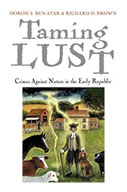Taming Lust: Crimes Against Nature in the Early Republic

Authors: Doron S. Ben-Atar and Richard D. Brown
Publisher: Philadelphia, PA: University of Pennsylvania Press, 2014. 216p.
Reviewer: George C. Thomas III | September 2014
Taming Lust is actually two books joined at the hip. One book examines the prosecutions of two octogenarians for having sex with animals near the close of the eighteenth century. For centuries, the crime against nature was viewed as a major sin; Thomas Aquinas told us that “the unnatural intercourse of man and beast” was “more base than the other three sexual sins: masturbation, homosexuality, and sex in a dorsal position.” (17). Sex with animals was also punished (in theory) by death in England and most of the colonies. (26). Indeed, Ben-Atar and Brown provide gruesome examples of Blackstone’s “avenging sword” in the seventeenth century. When teenager Thomas Granger was convicted in 1642 of having sex with sheep, goats, and cattle, the animals were killed in front of him; he was executed; he and the animals were thrown into giant pit; no use was made of them. (22-23).
But by the 1790s, according to the authors, prosecutions in the colonies for bestiality had been unknown for over a century. (26). Thus, prosecutions of 85-year-old John Farrell in western Massachusetts and 83-year-old Gideon Washburn in western Connecticut call for an explanation. The second book is the search for the explanation in the changing mores of America. Puritanism was losing out, the authors contend, and the prosecutions of Farrell and Washburn were a last-ditch attempt to wrest control of morals from those associated with “French sexual immorality, freethinking American Francophiles, and the utter ruin—moral and physical—caused by libertine conduct.” (107). Regardless of what the French might think, “Satan did not slumber.” (9). The discourse on changing sexual mores is illuminating, if a bit too detailed for my taste. And the first book, the examination of what is known about Farrell and Washburn and their prosecutions, is fascinating.
I am not persuaded that the two books have anything to do with each other. I do not believe that the authorities prosecuted these men because the “[l]ocal elites, while riding the rough waves of modernity, revived the prohibitions of their forefathers.” (9). Two other explanations seem more plausible to me. Both men were outsiders who had recently moved to rural communities “where personal and local disputes played a part in singling out the accused.” (71). This explanation is agnostic about whether the men actually had sex with animals; enemies could easily fabricate testimony. The other explanation assumes that these men, 83 and 85 years old, achieved erections and had sex with a mare (repeatedly over a period of four years, according to Washburn’s indictment) and a dog. (140 & 45-46). If that is true, what was left of the Puritan culture might well have viewed them as monsters controlled by Satan. Indeed, the trial judge said of Washburn that he had chosen to “grow old in the vile drudgery of sin and Satan.” (141). I favor the darker explanation, I prefer it. Any combination of explanations could be true, of course.
The “controlled by Satan” explanation might explain the refusal of the Connecticut legislature to pardon Washburn, a refusal that puzzles the authors. (143). It also explains the apparent willingness of the local elites to look the other way in the late eighteenth century when young men had sex with animals. (36). Teenage males having forbidden sex can be explained by rampant hormones. No such explanation excuses men in their eighties.
Other readers might agree with the book’s thesis that the second book (reaction to changing mores) caused the first book. But both books are worth reading for their fascinating history even if they are distinct from each other.
George C. Thomas III, Rutgers University Board of Governors Professor of Law, Judge Alexander P. Waugh, Sr. Distinguished Schola


